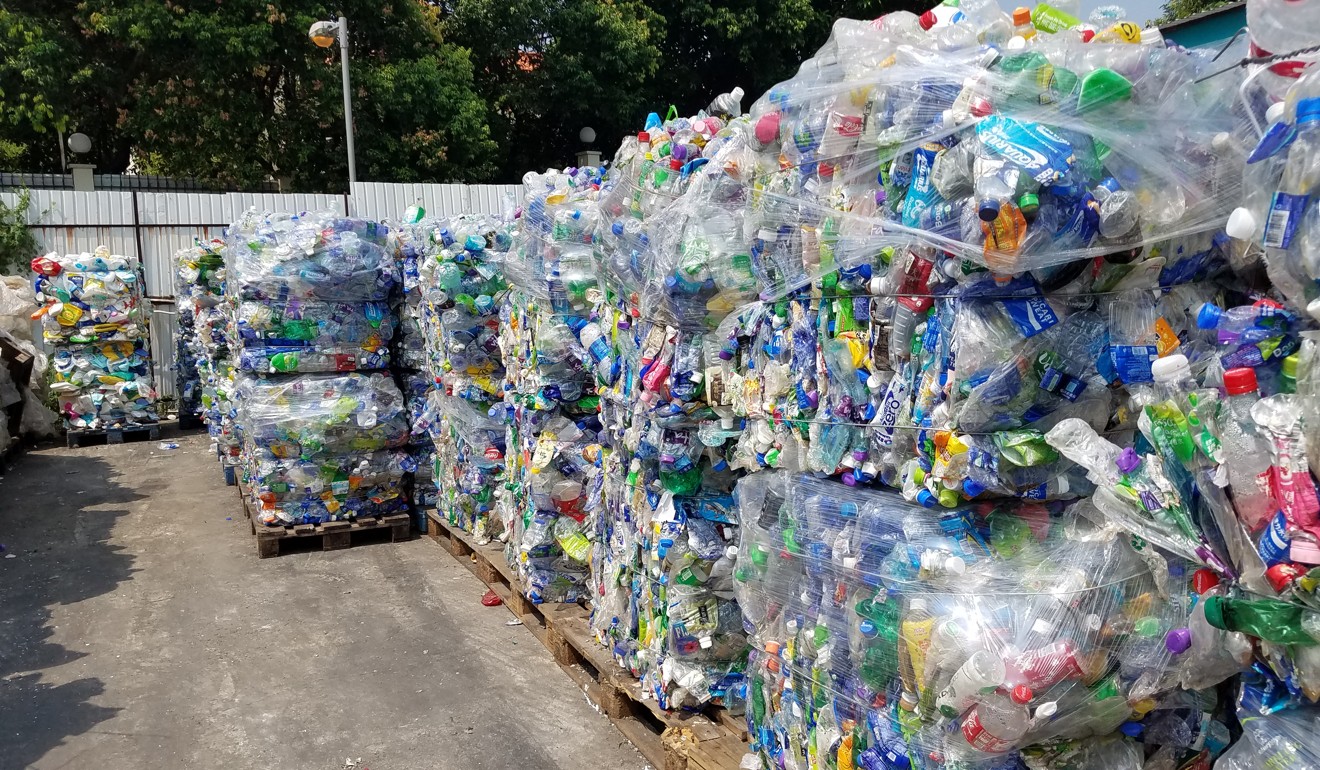
Green group urges Hong Kong race organisers to reduce waste at running events
Green Earth hopes the city can become a ‘green events capital’ after noting that much of the rubbish being thrown away at races is recyclable
A green group has called on local running event organisers to push forward more initiatives to reduce waste and build the city into a “green events capital”, as its research shows more than half of the rubbish thrown away at races was recyclable.
Out of the 15 races Green Earth monitored between last October and December, 80 per cent offered plastic bottles of water to participants while only 40 per cent had water refill services.
The group also revealed that more than half of the rubbish thrown away was recyclable. During the 15 running races, its volunteers observed 100 people using the most “noticeable” rubbish bin at each event. The average rate of recyclable items being placed in rubbish bins was 52.7 per cent.
Zero waste is ‘sexy’, says Hong Kong-based entrepreneur, out to change consumer attitudes
Only four events observed had recycling facilities while participants could use on-site recycling facilities in six other events, but the majority of the locations were not convenient.
Vivien Cheng Yu-wai, director of Green Earth’s community partnership, urged event organisers to implement more environmental measures to reduce waste.
“Hong Kong is an events capital and every week, or even every day, there are wide-ranging activities and events being held. Now, we want to go further and transform the city into a green events capital,” Cheng said.
“With the help of event organisers, we can reduce the amount of waste and minimise the impact on the environment to balance between having fun and protecting our environment.”
Last year, there were at least 250 running races across Hong Kong. During the observation period the green group conducted its research, 96 running events were held across the city. Of the 15 events observed, disposable cups were given to runners at eight events.
Two event organisers, which were not monitored, shared how successful green initiatives had helped to reduce the amount of waste, and even change the behaviour of participants.
Sylvia Chan May-kuen, vice-chairman of Hong Kong Water Race, said the result after implementing green initiatives was “encouraging”.
With the help of event organisers, we can reduce the amount of waste and minimise the impact on the environment to balance between having fun and protecting our environment
The amount of recycled litter at her event has dropped from 31kg in 2017 to 18.5kg this year, showing that less waste was being produced, while 10 of the prepared 240-litre dustbins were far from being full.
Still, Chan said it was difficult to change the minds of some participants, but “communication and education” were the keys to introducing the ideas.
Brenda Wong Yuk-han, fundraising manager at Oxfam Trailwalker, also conceded that a lot of preparation was required to fully endorse environmental initiatives, adding that at least half a year was needed to prepare before each event.
“We need to educate not only our participants, but also our volunteers and the support team of the participants. So, we need patience to educate them, as well as a clear and thoroughly assessed plan … so that participants know that we are all in this together and are willing to help.”
The amount of recycled materials has increased from “nearly zero” to more than 300kg in the past few years, Wong said. The organiser also no longer uses paper cups at the events, a reduction of more than 50,000 since 2016.
Avid runner Wong Ho-fai, who has taken part in more than 100 local races and over 50 overseas runs, said some organisers and runners had become more environmentally aware.
“The environment is our playground. If we keep producing this much waste, we could lose our environment and won’t have anywhere to go, especially for nature runners.”
The green group has produced a free guidebook for the public to learn about reducing waste and implement recycling initiatives.

Separately, a survey which polled 1,286 citizens and was conducted by the Civic Party showed that 87 per cent supported a ban on selling small bottles of water across the city. The majority of the respondents – 69 per cent – agreed that Hongkongers used a massive amount of plastic bottles daily, creating waste.
The latest government figures revealed that 79 tonnes of polyethylene terephthalate plastic bottles were thrown away each day in 2016.
Hong Kong can pay to dispose of electronic waste properly – it can’t afford more pollution
Since February, bottles of water that are one litre or less have been banned from sale in vending machines on government premises. But the Civic Party’s team said they had spotted small bottles of water being sold in several government-owned places, including the Victoria Park. The government said they had to wait until the renewal of contracts with some suppliers to fully implement the policy, according to district developer Henry Sin Ho-fai.
Civic Party lawmaker Kwok Ka-ki advised the government to follow San Francisco to fully ban selling small bottles of water, along with the “much-anticipated” producer responsibility scheme on plastic bottles to further encourage citizens to use their own bottles. He said water refill points should be set up in malls and MTR stations.
Some 62 per cent of respondents said they would be more willing to bring their own water bottles if there were more water fountains around the city, while 61 per cent said they had proactively reduced the amount of waste they produced.
